May 11, 2020
Starred Review for The Abortion Caravan
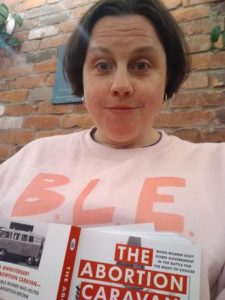
One thing I miss about those days in which we used to sit in cafes is the opportunity to flagrantly display the word “abortion” in public. A small act of resistance, but even better, I was reading an extraordinary book and my (starrred) review is now online at Quill & Quire.
Karin Wells’ book is a rich and vivid record of an event in Canadian history we all need to know better (where IS that Heritage Minute?) when a ragtag group of women travelled from Vancouver to Ottawa and shut down parliament in their protest against Canada’s unjust abortion laws, literally CHAINING THEMSELVES TO THE SEATS. (Women who worked in MPs’ offices forged them passes to the House of Commons.) It’s an incredible story and Wells tells it so well, tying the event to other activism sweeping North America at the time. (Wells speculates that the women weren’t arrested for their disruption because police were hyper conscious of optics, the Kent State killings having taken place the week before.) It’s such a good book! Read my review, and then read the book yourself. Buy a copy for your mom!
May 8, 2020
18 Ways That Living Through A Pandemic is ALSO Just Like Having a Baby

It’s been eleven years since the first time I had a baby, and in years since then, I have found that almost nothing is truly analogous to the experience. Until 2020, that is, notable for being the year I discovered not one but two analogies that were absolutely perfect. The first was when I got a sourdough starter back at the beginning of February, and I really wasn’t being facetious when I made the comparison—thought my approach was lighthearted, of course. But if I thought I was serious then, I’m really serious now, when we find ourselves smack dab in the middle of a global pandemic. It’s exactly the same, and now I am going to tell you why.
- The universe as we know it is shattered. Farewell to the distinctions between day and night, possible and not, our worst nightmares and reality. Between each day. There is grief and loss, and letting go of plans you made, the life you recognize, and the expectation of ground beneath your feet.
- There are no real answers, but in lieu of a world we recognize, and because we feel so vulnerable, we cling to dogma, signal virtue, and make up rituals to feel exempt from bad things ever happening to us.
- These rituals and signals become performative and are insufferably dull, and yet we share them on social media because we’re desperate for human connection.
- …but we’re also desperate for validation, to have all our biases and points of view confirmed, because anything otherwise only reminds us that the universe is shattered and that we’re all just clinging to life as we know it by the skin of our teeth,
- (Shhhh!)
- A person might wonder how a world could shrink so small.
- The ordinary world is rife with dangers we’d never considered before.
- If you look hard enough, you can find a doctor telling you what you want to hear. You will find that online community.
- Other people’s rituals and signals are anxiety-inducing and only underline that nobody really knows how to do this and we’re all making it up as we go.
- Everybody is getting snippy in Facebook threads.
- Obviously, there is not a lot a whole lot going on where you are.
- Nobody is getting enough sleep.
- Is this what the rest of my life is going to look like?
- I don’t remember signing up for this.
- But there are moments of light in the darkness, of grace. We’ve never had so much food dropped off on the porch, or received so many cards in the mail. We feel cut off from the world, and yet connected.
- We consider how the people with real problems must be faring, as we’ve been overwhelmed with fear and anxiety while sheltering safe at home.
- There are some days, sometimes, that seem almost normal.
- But that we’re still inside the storm makes it difficult to know whether or when it will ever be over.
And a hopeful addendum from my own experience, relevant if the analogy holds: one day it was.
May 7, 2020
Writers & Lovers, by Lily King
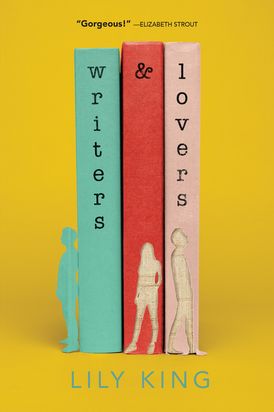
I was a bit wary of Writers & Lovers, by Lily King. I’d read her previous book, Euphoria, and I remember finding it a bit wanting (I am in the minority in this assessment), but then Maria Semple recommended this new novel on Instagram, and Maria Semple is a person I trust. I started reading it though, and thought: this is a novel that I’ve read before. The young woman who can’t get her life together, hold her liquor and whole makes terrible choices (see The Dud Avocado, Bridget Jones Diary) meets Lucky Jim, but for girls (and it’s different for girls) meets the MFA novel (any work of fiction that references Breadloaf, except for Ducks, Newburyport). “I just find it extraordinary that you think you have something to say,” our narrator is told on the second page, by the man who owns the property where Casey rents a potting shed that stinks of mould. She bakes cookies in a toaster oven, and almost everyone she ever knew who was a writer has gotten married and/or gone to law school. Casey is 31.
But I haven’t actually read this book before, unless you count Virginia Woolf’s To the Lighthouse where Lily Briscoe realizes her vision. Is Casey a fool or not to believe that she can make it as a writer, that the struggle is worth it, six whole years on a novel that maybe nobody will ever read? She makes money waiting tables at a restaurant in Harvard Square, she’s up to her eyeballs in debt and regret and heartache, and desperately mourning the death of her mother. An older writer (a widow with two young children) invites her into his orbit, clearly with domestic intentions, and maybe this is the answer to all her problems, but there is also the other guy, the one with whom the spark is undeniable—but right before their first date, he took off across the country on his motorcycle.
I am unaccustomed to reading about a woman who is flawed and who takes her art seriously, and I am unaccustomed to art that treats such a woman seriously, instead of as the butt of a joke. The book begins in familiar territory but then takes its reader to unexpected places, to previously unexplored terrain. How do you know you’re going to make it, until you make it, and it reminded me of reading Ann Patchett’s memoir of her friendship with Lucy Grealy, the two of them starting out in their careers, writing to save their own lives. And there’s a lightness to the tone that is possibly deceptive, that any story that’s such a delight to behold must necessarily be less than profound. That any woman who fails to be a perfect candidate must necessarily fail to triumph.
I loved this book, set in 1997, back you had to look up literary agents in guides at the library, and spend your last dollars mailing out your manuscript to the lot of them. A book that, as I said, begins in familiar territory, the usual tropes—the douchebag writer guy who’ll break your heart, the writer waiting tables, the possibly creepy mentor, the writer friend with whom one is in unspoken competition. But this portrait of the artist as a no-longer-young woman does something different and novel with all of these pieces, which is why the story so comes alive on the page.
May 5, 2020
A Match Made for Murder, by Iona Whishaw
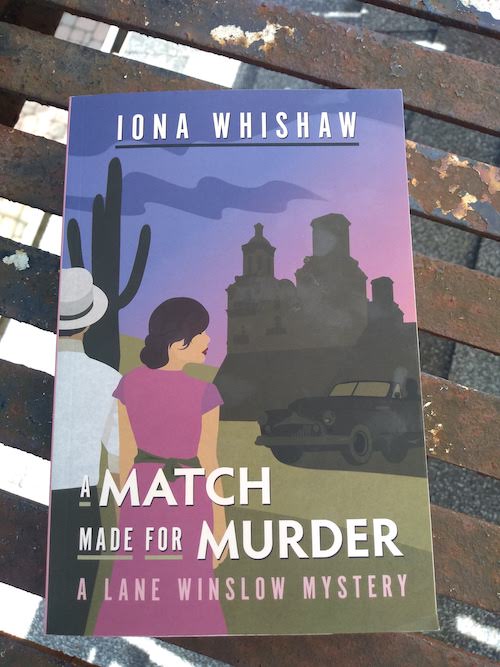
If you’ve ever wondered just how much they have to pay me to love the Lane Winslow mystery series as much as I do…the answer is nothing. And never has there been a series quite so easy to love, a series of books that has done wonders for my reputation as a person with good literary instincts, because everyone I recommend the series to loves them too, and that I get to receive a tiny bit of credit for that is marvellous luck. To have any kind of proximity to Lane Winslow is really a wondrous thing.
It never disappoints, this series, whose seventh installment is A Match Made For Murder, and Iona Whishaw has taken her heroine and her new husband on honeymoon to Tucson, Arizona. But first I’ll catch you up a bit, if you’re new to King’s Cove, the small village outside of Nelson, BC, where Lane Winslow—young, brilliant, beautiful, looking for a quiet life after spending WW2 spying for the British—retires in search of a quieter life, but she’s just got this knack for stumbling over bodies. Which brings her close to the handsome Inspector Darling—although in the first book, he’s arresting her on suspicion of murder. All that’s sorted out now, however, and the wedding has finally happened. On her honeymoon, at least, will Lane finally get the rest and relaxation she’s been seeking for the past two years?
But just while Lane is settled onto a lounge chair by the pool, reading a book (Nine Tailors, by Dorothy Sayers, naturally!), a shot rings out, and it won’t be the last one fired before the book is over. It turns out that Lane and Darling are surrounded by couples with complicated arrangements, mob connections, and possibly murderous intentions. Meanwhile, back in King’s Cove, Ames is left to unravel a curious case involving a dead man whose reputation for interfering with teenage girls goes back at least a decade, and when the woman he fancies turns out to have a connection to him, he struggles to retain his impartiality.
As always with Whishaw’s books, the novel is a delight, charming and funny, cozy and enveloping—by page 7, there are already scones. It’s also a wonderful literary homage to the classics of detective fiction, and I love that Nelson, BC, comes with its very own Baker Street. But coziness is not even the half of it—the series takes on race and racism (in this latest book, Nelson has its first Black police officer and Ames comes to understand that he gets to be regarded as an individual, while his colleague is forever representing an entire race), and misogyny, rape and spousal abuse all factor in this story, which is strongly concerned with the enormous power that men had at the time (and still have now) to control the women in their lives, and also with their sense of entitlement to that control. It’s an idea that is present in both Lane and Darling’s minds as they contemplate how their relationship might be different now that they are married—but then neither of them has ever had much taste for convention.
Lane Winslow, of course, will be keeping her name.
And here is Iona Whishaw reading from her new novel as part of 49thShelfLAUNCHPAD.
May 5, 2020
Gleanings
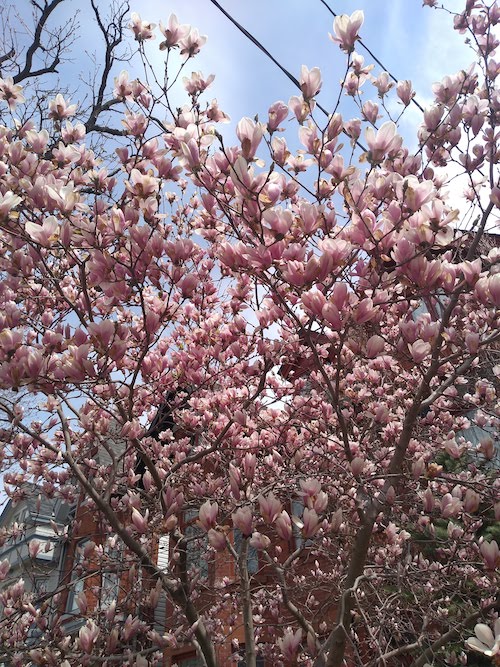
- We’re adapting. We didn’t want to. I’d rather be swimming…
- At this threshold, in this, our most vulnerable moment yet, can we find in our heart, our soul the empathy, the compassion and the kindness that is needed so badly?
- The pandemic might turn us all into birders.
- Pandemics actually “unfold in slow motion,” he says, and “there’s no event that changes the whole landscape on a dime.” But it feels that way, because of how relentlessly we quest for updates.
- We are living through unusual circumstances, and you are not obligated to do anything extra right now. But if a complete dinner on a single pan appeals, this one is pretty easy, and easy to adapt.
- I kinda want to say, “this week’s cake is…” but it is only Tuesday and there are five of us so half the cake is already gone.
- I’m not yet mourning or grieving the closure of the library. I guess I’m busy looking to the future of libraries.
- walking where no one walks
- From the very beginning, This Ain’t was familiar and it was all Hamilton.
- There, the sum of my sourdough expertise–it’s honestly not very much but has allowed me to cruise through many years of bread-making with much pleasure and little stress.
- I don’t want to leave my characters on the brink — maybe one or two, if they deserve it, but for at least some of them, I want church bells, or trumpets, or the Rocky theme song.
- The clouds have blown on, the sun is shining, it is 18°C and, at long last, it does seem as if we are in the opening stretch of an Ontario springtime in a year when optimism is utterly essential.
- However, if we can exercise our imagination and envision possibilities for the future, if we can live in a better future for even a few minutes in our minds, it is far likelier that we will experience hope and a belief in a better world.
- She gave me my love of reading which I treasure above most things in my life.
- Now I know, I know, you’re really not supposed to pick them but we have to cut ourselves some slack right now and I think the hedgerows can cope.
- I’m not sure they’ll function as vases. Or anything, for that matter. But I plan on glazing and firing them, anyway. We’ve come so far.
- Where on the map’s contours is the place where a woman paused to consider the beauty of the morning?
- She’s too smart and too artful a novelist to have left in anything that didn’t serve her purpose as she understood it, and she’s the kind of writer (meticulous, deliberate) who has earned my trust. That, arguably, shifts the burden to me: if the novel seemed too long to me, what was I missing?

May 4, 2020
Open House, by Jane Christmas

Something that truly shocks me are the number of attractive book covers identical in palette to my hideous bathroom, a bathroom whose hideousness I can blame on the fact that I don’t own a house, have never bought a house. The pink tiles and green blue tub are not something I ever would have chosen, but I have grown comfortable with them (and with the mildewed grouting) because it’s been home for 12 years now, and we live very comfortably here with rent that’s as affordable as my bathroom is ugly. (Which is to say: VERY)
But I have always been fascinated by houses, and how people live inside them, which is why I peruse real estate listings for fun, which is how I discovered my childhood home is currently for sale, and spent Friday morning virtually touring the place as in a dream. Which is why I was also a fan of the British property show Location Location Location when I lived in England, a nation whose sense of house and home is peculiar and fascinating, and felt very proud to rent a terrace house of my own (albeit just a two-up two-down, with nary a bay window), a photo of which hangs in my living room today (naturally with the bins out front). All of which makes me an ideal reader for Open House, Canadian Jane Christmas’s memoir of an extensive renovation on a Victorian terrace in Bristol she purchased with her third husband after their dream of living in a seaside town was scuppered by a variety of factors including SEAGULLS. Throughout the book, she examines her propensity for moving (she has moved 32 times!), her peripatetic childhood (and her many childhood homes in suburban Toronto, her marital homes, the places she lived in gritty 1980s Hamilton as a single mother.
The book has all the appeal of MLS listings, but with stories that don’t need to be guessed at. Instead, with characteristic candour, humour and flair, Christmas strips her life to the studs, and ruminates fascinatingly on notions of home and the places where we make them.
May 1, 2020
Actress, by Anne Enright
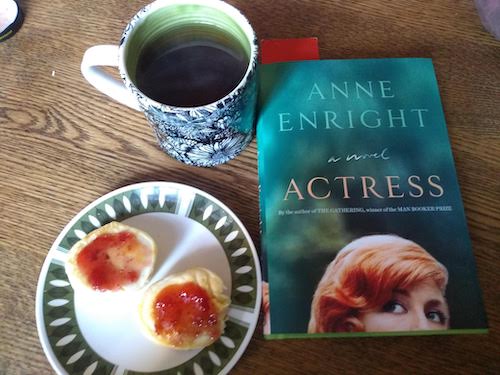
I find Anne Enright difficult, but not in the way I find other writers difficult. Which is so much so that I have absolutely no desire to read them, because life is difficult enough. But the work is usually worth it with Anne Enright, whose books are strange and beguiling, although ordinary at first glance—although I didn’t love her most recent The Green Road so much, a novel that was interesting that never really hung together in the way I wanted it to. For me, Actress was more satisfying, but also strange and disorienting, which isn’t a bad thing for a novel. Uncanny: to be both at home and not at home.
It’s the kind of book that’s just so specific, the kind of book of which you can’t say “it’s the kind of book…” at all otherwise. It’s so specific that’s difficult to fully comprehend that this is fiction, that Enright made the whole thing up, the singularly personality and career of Katherine O’Dell, the Irish theatre legend, her story told by her daughter, Norah, who grew up in her mother’s shadow, but this experience too is singular, as human experiences are. This is no Mommie Dearest, is what I mean. It’s so richly imagined and then filtered through the lens of Norah’s perspective, who’s missing half the details. A story by a daughter of her mother that is not a story of neglect or a litany of grievances, though there are some of these, but no more than with any human being. A different kind of take on mothers and daughters, that one can regard the other as a human being—albeit a complicated and flawed one, one who was eventually admitted to a psychiatric hospital after shooting a producer in the foot (which was less funny than it sounds—the injury caused torture for the rest of his days).
I appreciated this novel more after having read Say Nothing, by Patrick Radden Keefe, which filled in my understanding of The Troubles in Northern Ireland in the 1970s, though this part of the story is peripheral in The Actress. Intentionally so, because there are many things that Norah doesn’t want to know about her mother. But the part that resonated for me as I read this book in April 2020:
A funny thing happens when the world turns, as it turned for us on the night we burned the British embassy down. You wake up the next morning and carry on.
Anne Enright, The Acress





